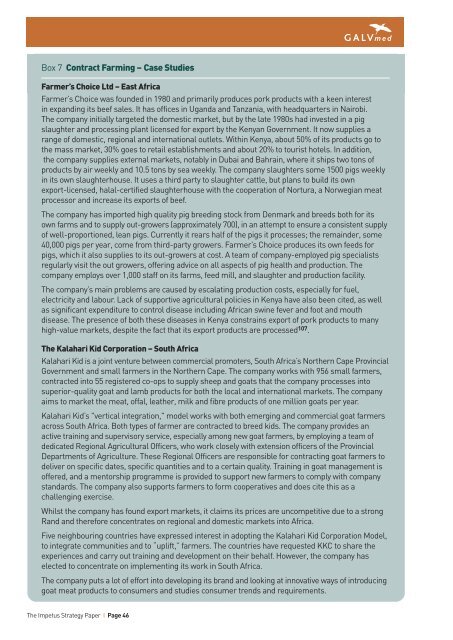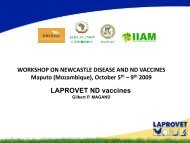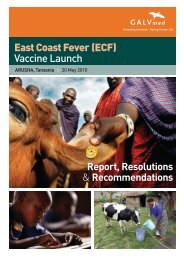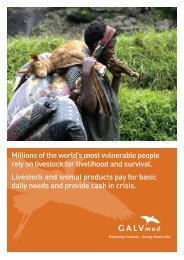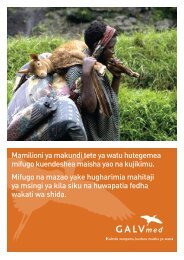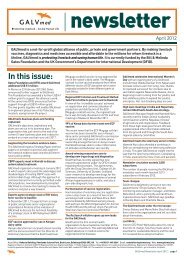A Path to Prosperity New Directions for African Livestock
GALVmed Impetus Strategy Paper
GALVmed Impetus Strategy Paper
- No tags were found...
Create successful ePaper yourself
Turn your PDF publications into a flip-book with our unique Google optimized e-Paper software.
Box 7 Contract Farming – Case Studies<br />
Farmer’s Choice Ltd – East Africa<br />
Farmer’s Choice was founded in 1980 and primarily produces pork products with a keen interest<br />
in expanding its beef sales. It has offices in Uganda and Tanzania, with headquarters in Nairobi.<br />
The company initially targeted the domestic market, but by the late 1980s had invested in a pig<br />
slaughter and processing plant licensed <strong>for</strong> export by the Kenyan Government. It now supplies a<br />
range of domestic, regional and international outlets. Within Kenya, about 50% of its products go <strong>to</strong><br />
the mass market, 30% goes <strong>to</strong> retail establishments and about 20% <strong>to</strong> <strong>to</strong>urist hotels. In addition,<br />
the company supplies external markets, notably in Dubai and Bahrain, where it ships two <strong>to</strong>ns of<br />
products by air weekly and 10.5 <strong>to</strong>ns by sea weekly. The company slaughters some 1500 pigs weekly<br />
in its own slaughterhouse. It uses a third party <strong>to</strong> slaughter cattle, but plans <strong>to</strong> build its own<br />
export-licensed, halal-certified slaughterhouse with the cooperation of Nortura, a Norwegian meat<br />
processor and increase its exports of beef.<br />
The company has imported high quality pig breeding s<strong>to</strong>ck from Denmark and breeds both <strong>for</strong> its<br />
own farms and <strong>to</strong> supply out-growers (approximately 700), in an attempt <strong>to</strong> ensure a consistent supply<br />
of well-proportioned, lean pigs. Currently it rears half of the pigs it processes; the remainder, some<br />
40,000 pigs per year, come from third-party growers. Farmer’s Choice produces its own feeds <strong>for</strong><br />
pigs, which it also supplies <strong>to</strong> its out-growers at cost. A team of company-employed pig specialists<br />
regularly visit the out growers, offering advice on all aspects of pig health and production. The<br />
company employs over 1,000 staff on its farms, feed mill, and slaughter and production facility.<br />
The company’s main problems are caused by escalating production costs, especially <strong>for</strong> fuel,<br />
electricity and labour. Lack of supportive agricultural policies in Kenya have also been cited, as well<br />
as significant expenditure <strong>to</strong> control disease including <strong>African</strong> swine fever and foot and mouth<br />
disease. The presence of both these diseases in Kenya constrains export of pork products <strong>to</strong> many<br />
high-value markets, despite the fact that its export products are processed 107 .<br />
The Kalahari Kid Corporation – South Africa<br />
Kalahari Kid is a joint venture between commercial promoters, South Africa’s Northern Cape Provincial<br />
Government and small farmers in the Northern Cape. The company works with 956 small farmers,<br />
contracted in<strong>to</strong> 55 registered co-ops <strong>to</strong> supply sheep and goats that the company processes in<strong>to</strong><br />
superior-quality goat and lamb products <strong>for</strong> both the local and international markets. The company<br />
aims <strong>to</strong> market the meat, offal, leather, milk and fibre products of one million goats per year.<br />
Kalahari Kid’s "vertical integration," model works with both emerging and commercial goat farmers<br />
across South Africa. Both types of farmer are contracted <strong>to</strong> breed kids. The company provides an<br />
active training and supervisory service, especially among new goat farmers, by employing a team of<br />
dedicated Regional Agricultural Officers, who work closely with extension officers of the Provincial<br />
Departments of Agriculture. These Regional Officers are responsible <strong>for</strong> contracting goat farmers <strong>to</strong><br />
deliver on specific dates, specific quantities and <strong>to</strong> a certain quality. Training in goat management is<br />
offered, and a men<strong>to</strong>rship programme is provided <strong>to</strong> support new farmers <strong>to</strong> comply with company<br />
standards. The company also supports farmers <strong>to</strong> <strong>for</strong>m cooperatives and does cite this as a<br />
challenging exercise.<br />
Whilst the company has found export markets, it claims its prices are uncompetitive due <strong>to</strong> a strong<br />
Rand and there<strong>for</strong>e concentrates on regional and domestic markets in<strong>to</strong> Africa.<br />
Five neighbouring countries have expressed interest in adopting the Kalahari Kid Corporation Model,<br />
<strong>to</strong> integrate communities and <strong>to</strong> “uplift,” farmers. The countries have requested KKC <strong>to</strong> share the<br />
experiences and carry out training and development on their behalf. However, the company has<br />
elected <strong>to</strong> concentrate on implementing its work in South Africa.<br />
The company puts a lot of ef<strong>for</strong>t in<strong>to</strong> developing its brand and looking at innovative ways of introducing<br />
goat meat products <strong>to</strong> consumers and studies consumer trends and requirements.<br />
The Impetus Strategy Paper I Page 46


